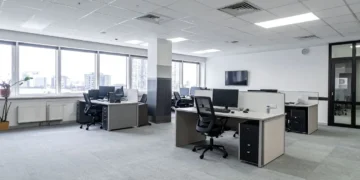- As organizations look to the future, many are planning on making remote work a permanent part of their work arrangements.
- However, companies that are choosing to adopt remote work policies are having to rethink their real estate strategies.
- Companies are weighing whether a sprawling urban headquarters still makes sense, which means that flexible workspaces stand to win some new clientele.
COVID-19 has undoubtedly changed the way people work. More importantly, the coronavirus pandemic has forced companies of all sizes to rethink their work arrangements and styles. If 8 months ago there was any skepticism about the effectiveness of remote work, that skepticism is long gone by now.
For the past 6+ months, most companies have allowed employees to work remotely. As organizations look to the future, many are planning on making remote work a permanent part of their work arrangements.
While some believed this meant the end of the office, the reality is far from it. However, companies that are choosing to adopt remote work policies on a more permanent basis are having to rethink their real estate strategies.
Afterall, if less people will be coming into the office on a daily basis, then a company’s space requirements will undoubtedly be reduced.
The Future of Corporate Real Estate Is Flexible
Over the past couple of years, flexible workspace operators have tried to attract corporate clients in the hopes of strengthening their business models.
With remote work on the rise, flexible workspaces stand to win some new clientele.
The flexible workspace industry has been hard hit by the pandemic. While the short-term outlook still remains uncertain, the medium and long-term outlook for flexible workspace operators looks quite bright.
In a recent report, Cushman & Wakefield argued that many large enterprises were likely to turn to coworking and other types of flexible workspaces to better support the new working styles of employees.
A research report from JLL had similar findings:
“The trend towards workplace mobility was not created as a result of the pandemic, but it was certainly accelerated by it. As a result, agile work strategies are expected to increase in a post-pandemic world, reinvigorating demand for flexible space.”
As more companies continue to embrace remote work and flexible work practices, more companies will have less demand for long-term leases. Some may even be less interested in having owned assets.
BP and Pinterest Backing out of Major CRE Deals Is a Good Indication that Flex Stands to Win
In fact, we are already seeing a shift in company sentiment towards real estate.
This past weekend (Aug. 29-30), two major companies announced major changes to their real estate strategies.
Bloomberg reported early Sunday morning that “BP Plc plans to sell its headquarters in central London as it cuts jobs and adopts flexible working.”
The oil company, which employs 6,500 office staff in the UK, stated that it “will move to a mixture of home working and office working.”
Similarly, Pinterest announced on Sunday that it had terminated the 490,000 square-foot lease it signed last year for 88 Bluxome Street in San Francisco’s SoMa District.
According to reports, “the lease termination is aimed at supporting a more diverse and geographically distributed workforce.” The company is rethinking where employees could be based.
While neither company specifically stated it plans to use third-party flexible space operators, the opportunity is there, especially if companies are rethinking where their employees could be based.
A recent Bisnow article argues that “as their (organizations’) older employees search for new suburban homes and young professionals let their leases expire, companies are weighing whether a sprawling urban headquarters still makes sense.”
Japanese company, Fujitsu, announced recently that it has plans to slash its real estate footprint by half in less than three years.
The company is planning to fully embrace telework. However, this doesn’t mean that the company won’t be needing any offices, according to reports.
“Under a concept known as a “borderless office,” the firm wants to better clarify the roles of such spaces, setting flexibility, productivity and communication as core values so that offices won’t just be a place for employees to demonstrate that they are there and working.”
According to company statements, Fujitsu “plans to make use of more third-party co-working spaces while also turning their local branches into satellite offices.”
Speaking to the Financial Times, IWG’s CEO Mark Dixon, recently stated that:
“Hub and spoke will be a major change for the property industry. We were doing it for quite a few companies pre-Covid, but demand is exploding.”



 Dr. Gleb Tsipursky – The Office Whisperer
Dr. Gleb Tsipursky – The Office Whisperer Nirit Cohen – WorkFutures
Nirit Cohen – WorkFutures Angela Howard – Culture Expert
Angela Howard – Culture Expert Drew Jones – Design & Innovation
Drew Jones – Design & Innovation Jonathan Price – CRE & Flex Expert
Jonathan Price – CRE & Flex Expert













